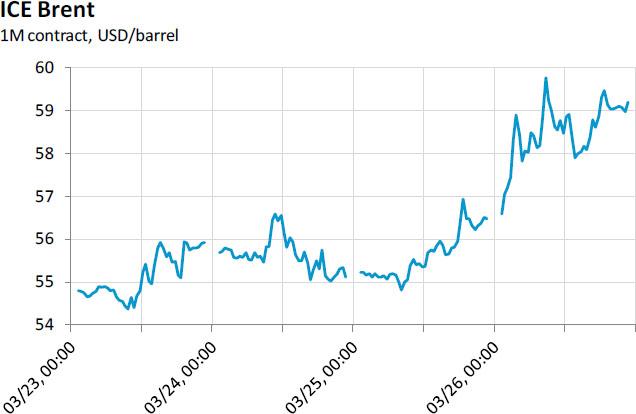Crude
The price of Brent soared and hit a two-week high yesterday on news that Saudi-led coalition started air-strikes in neighbouring Yemen. The market was thus reminded that geopolitical risks, which have been largely ignored in recent months, are still present.
Even though Yemen itself is a rather small producer of oil - in 2014, its average production reached 0.13 million barrels per day (bpd) – the news triggered a relatively large market response. The key reason probably is that market worries about a possible disruption of oil flow through the narrow Bab el-Mandeb (about 3.8 mbpd), which is, however, not likely given the pledge of the head of the US forces in the region to keep the route open. The reaction of oil price could also stem from the fact that the latest conflict even increases tensions between (Sunni) Saudi Arabia and (Shia) Iran, both major producers and exporters of oil (this is a long-term issue). The low probability of actual disruption of oil flows is nevertheless confirmed by today’s slide of the oil price back below 58 USD/bbl.
Regarding geopolitical risks, the talks between Iran and the world powers about its nuclear programme present larger risk for the oil price, in our view. If the agreement was reached and the Western sanctions were lifted, the country could increase its oil exports by 1 mbpd. This poses a clear downside risk for oil prices (especially in a situation of already oversupplied market).
We therefore maintain our view that the oil price could decline in weeks and months to come and expect more significant price growth towards the end of this year. The balance of risks is, however, skewed in the direction of longer period of low oil prices.
Chart of the day:
The oil price surged yesterday on news that Saudi-led coalition triggered air strikes in Yemen…
This non-exhaustive information is based on short-term forecasts for expected developments on the financial markets. KBC Bank cannot guarantee that these forecasts will materialize and cannot be held liable in any way for direct or consequential loss arising from any use of this document or its content. The document is not intended as personalized investment advice and does not constitute a recommendation to buy, sell or hold investments described herein. Although information has been obtained from and is based upon sources KBC believes to be reliable, KBC does not guarantee the accuracy of this information, which may be incomplete or condensed. All opinions and estimates constitute a KBC judgment as of the data of the report and are subject to change without notice.
Recommended Content
Editors’ Picks
AUD/USD risks a deeper drop in the short term

AUD/USD rapidly left behind Wednesday’s decent advance and resumed its downward trend on the back of the intense buying pressure in the greenback, while mixed results from the domestic labour market report failed to lend support to AUD.
EUR/USD leaves the door open to a decline to 1.0600

A decent comeback in the Greenback lured sellers back into the market, motivating EUR/USD to give away the earlier advance to weekly tops around 1.0690 and shift its attention to a potential revisit of the 1.0600 neighbourhood instead.
Gold is closely monitoring geopolitics

Gold trades in positive territory above $2,380 on Thursday. Although the benchmark 10-year US Treasury bond yield holds steady following upbeat US data, XAU/USD continues to stretch higher on growing fears over a deepening conflict in the Middle East.
Bitcoin price shows strength as IMF attests to spread and intensity of BTC transactions ahead of halving

Bitcoin (BTC) price is borderline strong and weak with the brunt of the weakness being felt by altcoins. Regarding strength, it continues to close above the $60,000 threshold for seven weeks in a row.
Is the Biden administration trying to destroy the Dollar?

Confidence in Western financial markets has already been shaken enough by the 20% devaluation of the dollar over the last few years. But now the European Commission wants to hand Ukraine $300 billion seized from Russia.
